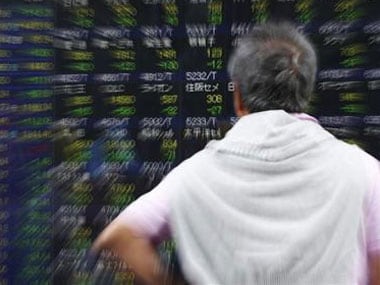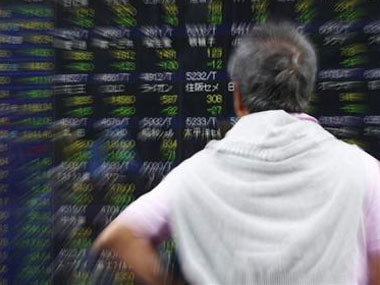Tokyo: Asia stocks hovered near four-month lows on Monday amid concerns about US-China tensions while the euro was confined to a narrow range after the weekend’s European Parliament elections. MSCI’s broadest index of Asia-Pacific shares outside Japan was virtually flat, a sliver above from a four-month low touched on Friday, with market holidays in the US and UK denting trading volumes. Casting a shadow over many share markets were worries the China-US trade conflict was turning into a technology cold war between the world’s two largest economies. Japan’s Nikkei average was up 0.3 percent by its midday break. Chinese shares began Monday higher but then slipped, with the benchmark Shanghai Composite down 0.3 percent and the blue-chip CSI 300 falling 0.6 percent. Hong Kong’s Hang Seng dropped 0.5 percent. Wall Street’s major indexes edged higher on Friday in a rebound from the previous session’s losses after comments from U.S. President Donald Trump on trade relations with China provided markets a bit of a respite. The euro was a shade higher at $1.1211, holding within a tight $1.2272-$1.2754 range in what was a limited reaction so far to partial returns in the European parliament elections. [caption id=“attachment_3021622” align=“alignleft” width=“380”]  Representative image. Reuters[/caption] Analysts said the single currency’s muted reaction came as the results showed populist and far-right parties in some countries were unlikely to have gathered as much support as anticipated. Parties committed to strengthening the European Union held on to two-thirds of seats in the EU parliament, official projections from the bloc’s elections showed on Sunday, though far-right and nationalist opponents saw strong gains. Macron’s Renaissance, built on the ruins of centre-left and centre-right parties, added to gains for liberals at the EU level as turnout bounced sharply across the bloc. Along with a surge for the Greens, that meant four groups occupying the pro-EU middle ground lost under 20 seats, securing 505 seats out of 751. “With a turnout of more than 50 percent, European elections were far less of a non-event than usual,” Robert Carnell, ING Asia-Pacific research head, said in a note to clients. “This was not a ringing endorsement for Euroscepticism - with only 22 percent of the seats going to EU sceptical parties, and even this bolstered by what may be a temporary surge in the UK’s Brexit party seats, the EU parliament remains a largely pro-European institution.” A centrist, pro-EU coalition would still be possible in the new chamber that will sit for the first time on July 2. But it would be more difficult to piece together among more numerous partners, according to the European Parliament’s estimates. The longer-term impact of the election, therefore, remained unclear, analysts say. “It’s difficult to foresee what will happen to Brexit, the political situation in Italy and elections in Greece just by looking at the vote count,” said Shin Kadota, senior strategist at Barclays in Tokyo. “We may not see an immediate market reaction, as the election outcome will have to seep in first before beginning to have a political impact on the various countries.” The pound was 0.2 percent higher at $1.2731 . Sterling had bounced back from a near five-month trough of $1.2605 after British Prime Minister Theresa May said she would quit. The dollar index against a basket of six major currencies inched down 0.1 percent to 97.565. The greenback was holding at 109.45 yen, 0.1 percent lower on the day. Oil prices were mixed on Monday as supply cuts led by producer club OPEC kept markets relatively tight, but Brent remained below $70 per barrel on concerns over the U.S.-China trade war. Front-month Brent crude futures, the international benchmark for oil prices, rose 0.2 percent to $68.79 per barrel while US West Texas Intermediate (WTI) crude futures retreated 0.1 percent to $58.55 per barrel.
Asia stocks hovered near four-month lows on Monday amid concerns about US-China tensions while the euro was confined to a narrow range after the weekend’s European Parliament elections.
Advertisement
End of Article


)

)
)
)
)
)
)
)
)



